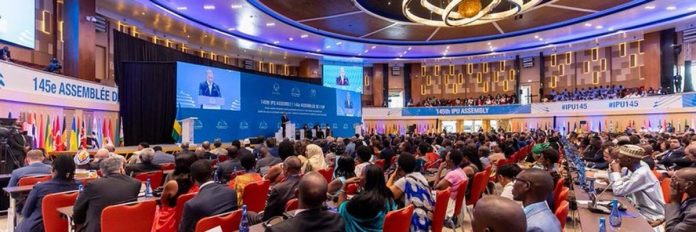Transboundary water cooperation ‘crucial’ for wider regional integration, peace: Pakistan

UNITED NATIONS ( Web News )
Pakistan has stressed the need for transboundary water cooperation, which responds to the challenges of shared water resources, as the world faces rising water scarcity.
“With most of world’s water resources, being shared between two or more countries, need for transboundary cooperation assumes even greater urgency,” Pakistani delegate Senator Farooq Naek told the Annual Parliamentary Hearing, a joint initiative between the President of the United Nations General Assembly (UNGA) and the Inter-Parliamentary Union (IPU).
Speaking in a dialogue on ‘Transboundary waters: From competition to cooperation for peace’, he said that cooperation in this regard plays a crucial role, in supporting wider regional integration, peace and sustainable development, as well as in tackling regional security challenges.
“It also plays a crucial role, in addressing climate change impacts, which place significant pressure on world’s transboundary waters,” Senator Naek said.
UN officials said that the Hearing will provide a parliamentary contribution to the UN Water Conference, which is being held from March 22-24, 2023, in New York.
More than 250 members of parliament, speakers, advisers and related officials from 60 countries are participating in the event at the United Nations Headquarters in New York.
In his remarks, Senator Naek said that strengthening transboundary water cooperation was also essential for reaching, water-related Sustainable Development Goals (SDGs) targets, and broader sustainable development targets.
For Pakistan, he said that transboundary water cooperation was of extreme importance as the country depended, for more than seventy per cent of its surface freshwater, on Indus River Basin’s major tributaries.
“Pakistan’s water economy,” Senator Naek added, “is overwhelmingly reliant on the Indus River – a river that flows across international political boundaries and is thus trans-boundary in nature.”
In this regard, the Pakistani delegate cited the 1960 Indus Water Treaty (IWT), a water-distribution treaty between India and Pakistan, negotiated by the World Bank, to use the water available in the Indus River and its tributaries.
For accelerating transboundary actions, in-support water-related targets, Senator Naek called for, among other steps, mobilizing the expertise of UN organizations and its partners.
Speaking in a dialogue on ‘Financing infrastructure for sanitation and water services: The trillion-dollar challenge’, Federal Minister for Parliamentary Affairs Murtaza Javed Abbasi stressed the need for fulfilling 100 billion in annual climate finance by developed countries.
He also said there are several challenges in achieving SDG six about safe water and sanitation, including increasing population growth, which results in increase in the use of of water, management of available groundwater, and contamination of fresh water supplies.
Climate change has also become a source of water deficiency, Abbasi said.
“To overcome these challenges, we believe that there are two essential requirements: finance and technology transfers through international cooperation,” the minister said.
Speaking in a dialogue on ‘Water conservation: The low hanging fruit”. Senator Faisal Saleem Rahman, said that water is a key element of national security and is every aspect of the State economy.
Pakistan’s national security, he said, is linked with its food security, which in turn is directly linked with water security.
“Public awareness, campaigns should be promoted to underscore the importance of conservation policy and sustainable use of water resources in partnership with all stakeholders,” Senator Rahman said.
Incentives for water conservation be given, such as on taxation where installation of rainwater harvesting in domestic and commercial buildings are done, he said, adding that pricing on basis of use, not on basis of supplies be ensured.

